unit 3 Text b Bike to work
人教版初中英语七年级下册Unit 3 Section B名师课件(三课时)

Practice
A: How does he get to school? B: First, he ...
Then he ...
Practice
A: How does he get to school? B: First, he rides a bike to the subway station.
Their dream is to have a bridge. I think their dream can come true. Maybe the government can build a bridge for them.
1. For the students in the village, itdifsfic_u_lt_______ to get to school. It is (not)+ adj. + to do sth.
For example
A: How do you get to school? B: First, I ...
Then I …
Practice
A: How does he get to work? B: First, he walks to the bus stop.
Then he takes a bus to work.
Review How do you get to school? How long does it take?
18 minutes
I take a taxi to school. I get to school by taxi. It takes about 18 minutes.
人教版七年级英语下册(RJ) Test for Unit 3
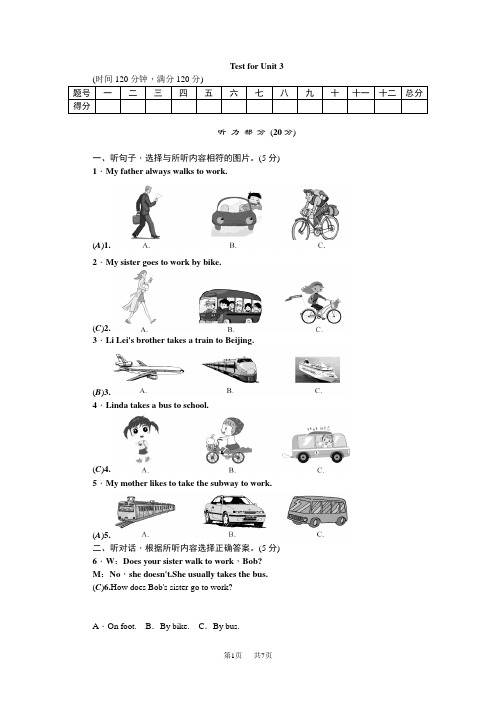
Test for Unit 3听力部分(20分)一、听句子,选择与所听内容相符的图片。
(5分) 1.My father always walks to work.(A)1.2.My sister goes to work by bike.(C)2.3.Li Lei's brother takes a train to Beijing.(B)3.4.Linda takes a bus to school.(C)4.5.My mother likes to take the subway to work.(A)5.二、听对话,根据所听内容选择正确答案。
(5分) 6.W:Does your sister walk to work,Bob?M:No,she doesn't.She usually takes the bus.(C)6.How does Bob's sister go to work?A.On foot. B.By bike. C.By bus.7.W:How long does it take you to get to the store,Bill?M:About twenty minutes.(B)7.How long does it take Bill to get to the store?A.About fifteen minutes. B.About twenty minutes.C.About thirty minutes.8.M:Do you take the bus to school every day,Jane?W:No,I usually walk to school,because my home isn't far from school.(C)8.How does Jane usually go to school?A.By bus. B.By bike. C.On foot.9.W:How can we get to that small village?M:We need to go there by boat.(A)9.How can they get to the small village?A.By boat. B.By train. C.By subway.10.W:How far is it from your home to school,Tim?M:It's one kilometer from my home to the bus stop,and eight kilometers from the bus stop to school.(C)10.How far is it from Tim's home to school?A.One kilometer. B.Eight kilometers.C.Nine kilometers.三、听对话,根据所听内容选择正确答案。
8Aunit3-4

8A Unit 3—4 Revision一. 单项选择( )lie found _______difficult to play the piano well.A. it’sB. itC. thatD. this( )2. Thank you for _______ let me _______ fishing with you today.A. agreeing; goB. agree; goC. agreeing to; goD. agree to; go ( )3. China is a big country ________ a long history.A. andB. butC. hasD. with( )4. No one taught ________ English. He learned it _________.A. him; by himselfB. his; by himselfC. him; himselfD. his; by himself ( )5. The trip _______ about 3 hours from the school to the park.A. costB. usedC. spentD. took( )6. There ________ a lot of traffic in the daytime.A. areB. isC. are goingD. will have( )7. Tom arrived _______a warm spring morning.A.atB. onC. inD. by( )8. He told Tom _______ read in the sun because it was bad for his eyes.A. toB. doesn’tC. not toD. to not( )9. He always thinks more of ________ than of _______.A. him; otherB. the other; himC. hims elf; the otherD. others; himself ( )310. Why ________ come to school earlier?A. not toB. notC. don’tD. don’t to( )11.His computer doesn’t work. So he bought a new_____A.itB.oneC.themD.anothet( )12.—Can you help me with the bike?---Sorry , it______, “Do it your self”A.speaksB.talksC.tellsD.says( )13.He always ________the instructions on the bottle.A.readsB.looks atC.watchesD.sees( )14.---Can you help me repair my bike? ---- _______.I am coming.A.Of course notB.Thank youC.No problemD.You are welcome ( )15.The room is _____with lots of people.A.fillB.filledC.fullD.fulled( )16.His father advised me _____it again.A.tryB.tryingC.to tryingD.to try( )17.You had better_____talk in class without permission.A.notB.don’tC.noD./( )18.You______tell him the result right away.A.should notB.should not toC.should to notD.not should( )19.It’s raing. You’d better stop_____A.workingB.to workingC.to workD.work( )20.Not only the students but also the teachers_______early in this school.A.get upB.gets upC.getting upD.are getting up二、词汇A. 根据句意及首字母或汉语提示完成句子1. Thanks for __________ (同意) to let me watch the match on TV.2. The city streets are full of (来往车辆).3. Xi Jinping is the ______________(国家主席) of China.4. The children took a boat ________________(旅行) along the Yellow River last Sunday.5. We had to move (里面)when it started to rain.6. I’m p________ for the trip to Guangzhou. It will cost a lot of money.7. The teacher w__________ who broke the window.8. Our team w________the basketball match f inal today.9. He stayed at home and watched TV i___________of goin g out to play with his friends.10.There was t________ snow last week and all the ground was white.11.______________(几乎) no one here can answer my question.12.What_____________(工具) should I use to plant the tree?13.The books on this ___________(架子) are all about science.14.O__________ there was a boy called Tom who told me the story.15.My teacher a__________ me to buy a dictionare.16.When will you a_________the meeting? Next Monday afternoon.17.I don’t know the word. So I can’t __________(拼) it.18.LiLi’s father is ill, I will look after him, i________B 用所给词的适当形式填空19. Thank you very much for keeping the secret to ________________(you).20. _______ (lucky), he didn’t catch the last train to Shanghai.21. When you walk slowly around the lake, you can feel the _______(beautiful) of this city.22. He writes ___________ (care) in his class.15. Yesterday he ________ (drive) to his office, but this morning he _____ (ride) there.23. They listened to some music at the ________(begin) of the meeting.24. The scientists told us some stories about _________(amaze) UFOs .25. It’s _________(real) fun to learn foreign languages.ually I can’t read the map____________(correct).27.I like eating ______________(tomato) because they are healthy fro health.28.They now have a blue____________(live) room.29.I look thin, but he looks even __________(thin).30.The boy is too young to look after _____________(he) .三. 完形填空Years ago, my friend and I went to the Caribbean. We stayed at the Winding Bay Hotel first.The owner of the hotel, Mr Emeritus, was nice and was always __1__ to help others. A few days later, we were planning to sta y for four days at the Cable Beach Hotel at another place. Mr Emeritus told 2 that he knew the owner of it. He gave us his 3 and told us to give it to the front desk when we got there. We thought that we might receive a fruit basket or something like that, because the 4 knew each other.5 we arrived at the Cable Beach Hotel, I gave the card to the front desk. The man6 us up to our room. We enjoyed our time at the hotel. When we would leave, the man told us we only needed to7 one phone call. I told him that he made a mistake. However, he told us that Mr Emeritus paid for everything else. We were so __8__.After we returned home, we sent a letter to the owner and thanked him for making our 9 memorable (难忘的). For years, we kept 10 Christmas cards to him, and he sent them to us, too!( )1. A. hard B. ready C. honest D. true( )2. A. us B. you C. them D. him( )3 A. money B. number C. card D. address( )4. A. hosts B. hotels C. waiters D. owners( )5. A. When B. Before C. If D. So( )6. A. taught B. took C. caught D. carried( )7. A. look for B. wait for C. pay for D. ask for( )8. A. frightened B. general C. popular D. surprised( )9 A. taste B. advice C. trip D. practice( )10. A. buying B. sending C. wanting D. hoping四.根据中文提示完成句子1.你知道这个标记代表什么吗?Do you know what this sing______ ________?2.别痴迷于玩电脑游戏。
人教新目标版七年级英语下册Unit3单元测试卷及答案

to take off and it is often late. You can’t open the windows. You can’t choose the food.
Planes are fast, but they still take hours to go out of the airport and into the city.
B.takes subway;by bike
C.takes the subway;by the bike
D.takes subway;by the bike
( )8.Twenty and sixty is
.
A.eight
B.eighteen C.eighty
D.eighth
( )9.Two Day.
I also like cars. You can start your journey when you want to, and you don’t need to get to a railway station or a bus stop. Also you can carry many things with you in a car.
( )4. I want to __________ to Beijing.
A. on a train
B. take a train
C. by train
D. take train
( )5. —_______ do you go to work?
—I take a bus.
A. When
B. Where
B.rivers
C.bridges
D.villages
( )26.A.He
Unit3 Unit 3 How do you get to school知识点归纳总结
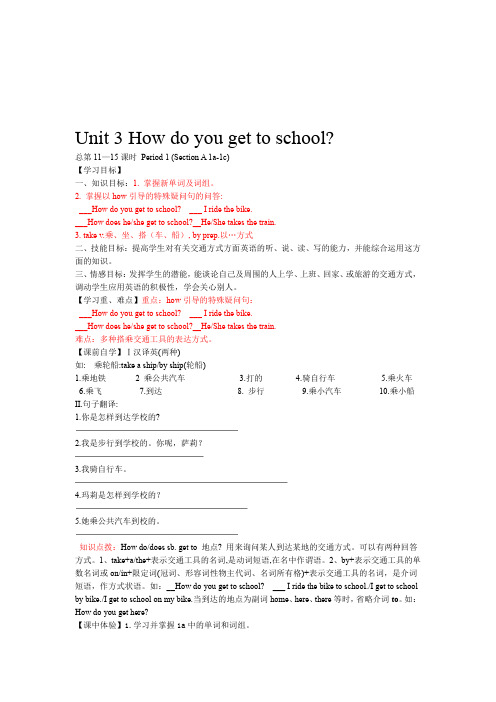
Unit 3 How do you get to school?总第11—15课时Period 1 (Section A 1a-1c)【学习目标】一、知识目标:1. 掌握新单词及词组。
2. 掌握以how引导的特殊疑问句的问答:___How do you get to school? ___ I ride the bike.___How does he/she get to school?__He/She takes the train.3. take v.乘、坐、搭(车、船), by prep.以…方式二、技能目标:提高学生对有关交通方式方面英语的听、说、读、写的能力,并能综合运用这方面的知识。
三、情感目标:发挥学生的潜能,能谈论自己及周围的人上学、上班、回家、或旅游的交通方式,调动学生应用英语的积极性,学会关心别人。
【学习重、难点】重点:how引导的特殊疑问句:___How do you get to school? ___ I ride the bike.___How does he/she get to school?__He/She takes the train.难点:多种搭乘交通工具的表达方式。
【课前自学】Ⅰ汉译英(两种)如: 乘轮船:take a ship/by ship(轮船)1.乘地铁 2 乘公共汽车 3.打的 4.骑自行车 5.乘火车6.乘飞7.到达8. 步行9.乘小汽车10.乘小船II.句子翻译:1.你是怎样到达学校的?2.我是步行到学校的。
你呢,萨莉?3.我骑自行车。
4.玛莉是怎样到学校的?5.她乘公共汽车到校的。
知识点拨:How do/does sb. get to 地点? 用来询问某人到达某地的交通方式。
可以有两种回答方式。
1、take+a/the+表示交通工具的名词,是动词短语,在名中作谓语。
2、by+表示交通工具的单数名词或on/in+限定词(冠词、形容词性物主代词、名词所有格)+表示交通工具的名词,是介词短语,作方式状语。
unit3-how-do-you-get-to-school导学案(五课时)
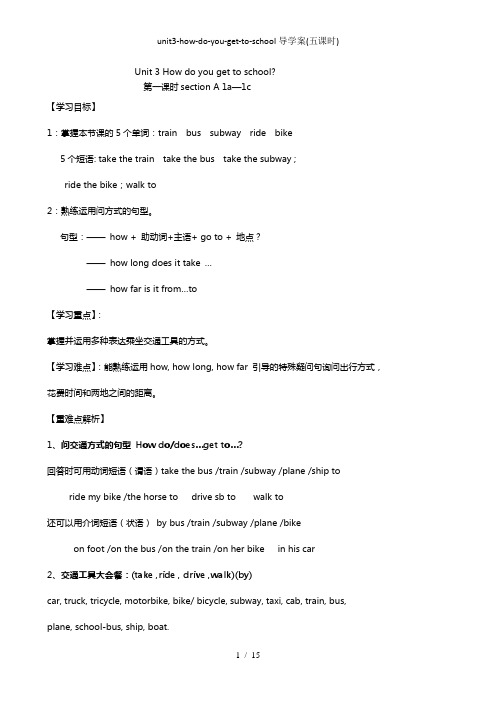
Unit 3 How do you get to school?第一课时section A 1a—1c【学习目标】1:掌握本节课的5个单词:train bus subway ride bike5个短语: take the train take the bus take the subway ;ride the bike;walk to2:熟练运用问方式的句型。
句型:——how + 助动词+主语+ go to + 地点?——how long does it take …——how far is it from…to【学习重点】:掌握并运用多种表达乘坐交通工具的方式。
【学习难点】:能熟练运用how, how long, how far 引导的特殊疑问句询问出行方式,花费时间和两地之间的距离。
【重难点解析】1、问交通方式的句型How do/does…get to…?回答时可用动词短语(谓语)take the bus /train /subway /plane /ship to ride my bike /the horse to drive sb to walk to还可以用介词短语(状语)by bus /train /subway /plane /bikeon foot /on the bus /on the train /on her bike in his car2、交通工具大会餐:(take ,ride , drive ,walk)(by)car, truck, tricycle, motorbike, bike/ bicycle, subway, taxi, cab, train, bus, plane, school-bus, ship, boat.【自主预习】翻译下列单词和短语:搭乘_________ 地铁_________ 走,步行_________ 火车_________ 分钟_____花费_________ 乘坐公共汽车_________ 远的,遥远的_________ 公里_________英里_________ 乘坐小船________坐地铁___________ 骑自行车___________在医院里_________ 火车站_________【合作探究】表示“乘坐交通工具”有以下几种方法①“take+the/a+交通工具名称(+地点名词)”意为“乘……去某地”。
2020年春七年级英语下册Unit3Howdoyougettoschool(第1课时)分层训练(新版)人教新目标版

Unit 3 How do you get to school?第1课时分层训练[Section A1 1a2e]Ⅰ.根据句意及汉语提示完成句子1.—How old is his grandmother?—She is ________ (九十).2.It usually takes me ten ________ (分钟) to eat my breakfast.3.My father wants to buy me a ________ (新的) bike on my birthday. 4.They always ________ (骑) their bikes to work.5.She knows ________ (每一个) teacher in this school.Ⅱ.用恰当的介词填空1.—Does your mother go to work ________ car?—No. She goes to work sometimes ________ foot, sometimes ________ bike. 2.He often goes sightseeing(观光) ________ his car.3.I get ________ the hospital at 9:30.4.—How far is it ________ your home to school?—It's 5 miles.5.He goes to school ________ around seven ________ the morning.Ⅲ.根据句意及图片提示,用适当的单词填空1.My brother ________ ________ ________ to work every day.2.Kate's brother usually ________ to school.3.Let's go to the library ________ ________.4.Some students in our class ________ ________ ________ to school.5.I will go to Shanghai ________ ________ next week.Ⅰ.单项填空( )1.Does Lily often go to work ________?A.by her bike B.by bikeC.on bike D.by a bike( )2.—________ does it take to do your homework every day?—About an hour.A. How longB. How oftenC. How farD. How many( )3.Two ________ children plant ________ trees along the road. A.hundreds; hundreds ofB.hundreds; hundred ofC.hundred; hundreds ofD.hundred; hundred of( )4.________ takes her ten minutes________ there.A.It; to get B.Its; to get toC.Its; to get D.It; to get to( )5.—__________ are you going to London?—By air.A.How B.WhenC.Where D.Why( )6.—________ is it from your home to school?—Three kilometers.A.How far B.How muchC.How soon D.How longⅡ.句型转换1.Alice's father takes the subway to work every day.(改为同义句)Alice's father ________ to work ________ ________ every day.2.They ride__their__bikes to school.(对画线部分提问)________ ________ ________ get to school?3.It takes about__forty__minutes to get to the cinema.(对画线部分提问) ________ ________ ________ it ________ to get to the cinema?4.It is about__two__kilometers from my home to school.(对画线部分提问) ________ ________ is ________ from your home to school?5.He rides to work on Mondays.(改为同义句)He goes to work ________ ________ on Mondays.He goes to work ________ ________ ________ on Mondays.详解详析课内基础自测Ⅰ.1.ninety 2.minutes 3.new4.ride 5.everyⅡ.1.by; on; by 2.in3.to 4.from 5.at; inⅢ.1.rides his/a bike 2.walks 3.by bus 4.take the subway 5.by train 课后巩固提升Ⅰ.1.B by 作“乘”讲时,后面直接接交通工具名词,名词前不需加任何限定词;on/in 与交通工具名词连用时,名词前需加限定词。
Unit3(语篇组合提升练)-2022-2023学年七年级英语下册单元模块满分必刷题(人教版)

20222023学年七年级英语下册单元模块满分必刷题(人教版)Unit 3 How do you get to school【刷能力】(语篇组合提升练) Part 1:完型+阅读+短填 Part 2: 单元话题满分写作:交通方式一、完形填空01When I was a kid, I often rode my mountain bike everywhere. It was one of my favourite ____1____ to get exercise. But as I grew up, I stopped riding my bike. After I entered (入学) a university in Australia, I didn’t even have a bike any more. It can be very ____2____ to ride a bike in cities in Australia. There are not many bike paths (路径), and cars sometimes hit the people on the bike and ____3____ kill (杀死) them. Now that I’m living in Beijing, I’m having fun on the ____4____ again. I ride my bike to the gym, to the supermarket or to the park.It can be scary (吓人的) with lots of cars, motorbikes and people ____5____. I always look out for traffic ____6____ I am turning or crossing the road. I never ride too fast. Riding bikes ____7____ me feel fortable and it is a fun way to know much about the city!I start to use Sharebike (共享单车), too. ____8____ weekends, my friend and I sometimes ride Sharebikes to the Olympic Park. Apps like Sharebike make it easy and cheap for ____9____ to ride.If we all try to ride bikes often and drive _____10_____, there will be less pollution (污染) . So what are you waiting for? Get on a bike and ride with me!1.A.traffic B.ideas C.ways D.advice 2.A.dangerous B.successful C.useful D.exciting3.A.either B.till C.however D.even4.A.bus B.bike C.car D.plane5.A.except B.around C.behind D.in front of 6.A.because B.when C.but D.so7.A.makes B.agrees C.happens D.catches8.A.From B.With C.Under D.On9.A.everything B.anything C.everyone D.nobody10.A.farther B.better C.less D.more02There are different kinds of trains in the world. Trains can ___11___people, animals, and other things. Some trains are ___12___ , and some are slow. They can reach most of the cities and towns. Some trains go ___13___the hills if they are too high to go over. In big cities, the streets are usually ___14___ and some cars and buses often have to wait. So you can find trains under the ___15___ and trains on rails above the streets. People can quickly be brought in or taken out. Can a train run over ___16___ ? Yes, it can. There are many bridges over the rivers. But it is not easy to ___17___ bridges. Today’s trains have dining cars(餐车)for people. You may ___18___ something in them on the way if you are hungry. Trains are___19___ to men, women and children. Many children like to play with model trains. With the model trains, they can build their own rails and___20___ the wonderful world of trains.11.A.carry B.make C.show D.leave12.A.help B.expensive C.fast D.empty13.A.through B.among C.during D.above14.A.full B.dirty C.free D.busy15.A.sea B.farm C.ground D.garden16.A.water B.air C.forests D.mountains17.A.mend B.watch C.reach D.build18.A.cook B.eat C.find D.pick19.A.useful B.polite C.bad D.lucky20.A.hate B.are afraid of C.get on well with D.enjoy03How do you go to school every day? For most students in cities, it’s __21__ for them to get to school. They can walk or ride a bike to school. They can get to school by bus or even by subway. It won’t __22__ them too long to get to school and back home.But for some students in faraway villages, things are quite __23__. Life for them is hard. It’s difficult for them to get to school every day. Usually they will spend a few __24__ on the way. In one small village, there is a big river __25__ the school and the village. The students can’t get to school by boat because the river __26__ too quickly. They have to go on a ropeway to __27__ the big river. Though it’s dangerous, they are used to it and are not afraid. In their mind, going out to study is their __28__ thing. Because of this, manyvillagers __29__ leave their village. How they are looking forward to having a ___30___! I do hope one day their dream can e true.21.A.good B.easy C.dangerous D.hard22.A.take B.cost C.spend D.pay23.A.mon B.important C.different D.easy24.A.minutes B.hours C.days D.seconds25.A.beside B.between C.behind D.across26.A.changes B.turns C.runs D.waters27.A.cross B.go through C.walk across D.go over28.A.hardest B.worst C.happiest D.easiest29.A.never B.often C.sometimes D.ever30.A.boat B.bridge C.road D.car二、阅读单选0131.How does Anna go to school?A.On foot.B.By car.C.By bus.D.By boat.32.When does Paul probably(可能)go to work?A.At 6:00 a.m.B.At 9:00 a.m.C.At 1:00 p.m.D.At 8:00 p.m.33.What does Mary probably do?A.A teacher.B.A student.C.A doctor.D.A cook.34.Which of the following is NOT true?A.Anna likes her way of going to school.B.Paul often takes a shower for half an hour.C.Paul always goes to work on time.D.It usually takes Mary about 35 minutes to go to work by bus.35.Why does the writer write the article?A.To tell us about different kinds of jobs.B.To tell us about some ways of going out.C.To tell us about some people’s daily life.D.To tell us about some people’s family.02Dear David,I’m very glad you are arriving in my city at 3:00 p.m. this Sunday. Now let me tell you the way to the Blue Sky Restaurant. I’ll meet you there. Take a taxi from the bus station and go down New Bridge Avenue. Go across the big bridge. When you see a bank, turn right and go through Bank Street. You’ll pass three oneway avenues: Sixth Avenue, Seventh Avenue and Eighth Avenue. When you see a big McDonald’s, turn left. Then go along Green Avenue until (直到) you see New Park. Turn left and go down Center Street. The Blue Sky Restaurant is on your right. I hope you have a good trip.Yours,Larry 36.Larry will meet David in a _________.A.bank B.restaurant C.McDonald’s D.park37.Larry asks David to _________ from the bus station to the Blue Sky Restaurant.A.take a taxi B.take a bus C.ride a bike D.take a plane38.The big bridge is on _________.A.Center Street B.Bank Street C.New Bridge Avenue D.Sixth Avenue39.The Blue Sky Restaurant is _________.A.on the left of New Park B.on the right of the bankC.on the left of Green Avenue D.on the right of Center Street40.Which of the following is TRUE?A.David can see a big McDonald’s on his way to the restaurant.B.David and Larry will have lunch after David’s arrival.C.When David sees a bank, he should turn left.D.There are four avenues in the letter.03阅读下面短文,选择正确答案,并将其代表字母填入题前括号内。
Unit3TraveljournalPeriod1课件3
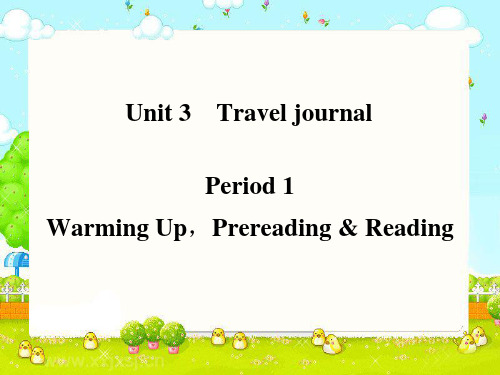
即学即用
完成句子 ①I prefer to walk there ________(也不愿意乘公共汽车). 【答案】rather than take a bus ②I prefer spending the weekend at home to ________________(也不愿和他们一起去郊游). 【答案】going on an outing with them
Ⅱ.短语天地 1.e_v_e_r_s_in_c_e_从那以后 2.b_e_f_o_n_d__o_f 喜欢;爱好 3.__c_h_a_n_g_e_o_n_e_'_s_m__in_d_____改变主张 4.c_a_r_e_a_b_o_u_t关心;担忧;惦念 5.___p_e_r_s_u_ad_e__s_b_t_o_d_o__st_h_______说服某人做某事 6.at an altitude of…___在__…__…__海__拔__处______ 7.give in____投__降__;__屈__服__;__让__步________ 8.attitude to_____对__…__…__的__态__度_____________ 9.get sb interested in __使__某__人__对__…__…__感__兴__趣___ 10.graduate from ____从__…__…__毕__业_____________
5.finally adv.最后,终于 (1)在列举事物或论点时,用来引出最后一项内容。 She put some soil in the box,then sowed the seed carefully,and covered it with more soil. Finally she kept the box in the shade.她在盒子里放些土,然后仔细地播种, 之后再盖上一些土,最后她把盒子放在阴凉处。
人教新目标七年级英语下册:Unit 3 Section B 达标练习题附答案
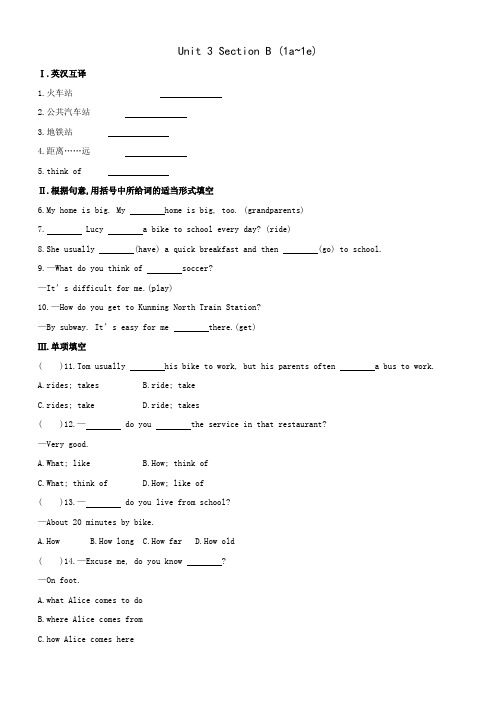
Unit 3 Section B (1a~1e)Ⅰ.英汉互译1.火车站2.公共汽车站3.地铁站4.距离……远5.think ofⅡ.根据句意,用括号中所给词的适当形式填空6.My home is big. My home is big, too. (grandparents)7. Lucy a bike to school every day? (ride)8.She usually (have) a quick breakfast and then (go) to school.9.—What do you think of soccer?—It’s difficult for me.(play)10.—How do you get to Kunming North Train Station?—By subway. It’s easy for me there.(get)Ⅲ.单项填空( )11.Tom usually his bike to work, but his parents often a bus to work.A.rides; takesB.ride; takeC.rides; takeD.ride; takes( )12.— do you the service in that restaurant?—Very good.A.What; likeB.How; think ofC.What; think ofD.How; like of( )13.— do you live from school?—About 20 minutes by bike.A.HowB.How longC.How farD.How old( )14.—Excuse me, do you know ?—On foot.A.what Alice comes to doB.where Alice comes fromC.how Alice comes hereD.how does Alice come here( )15.It me fifteen minutes the park.A.takes; get toB.takes; to get toC.take; to get toD.take; get to( )16.— does it take you to finish your homework every day?—About two hours.A.How farB.How longC.How muchD.How manyⅣ.按要求完成下列各题17.Jane goes to school by subway.(改为一般疑问句)Jane to school by subway?18.It’s thirty minutes’ walk from the post office to my home.(对画线部分提问)is it from the post office to your home?19.It takes her half a day to draw this picture.(对画线部分提问)does it take her to draw this picture?20.Mr. Miller usually walks to the supermarket.(改为同义句)Mr. Miller usually goes to the supermarket .21.I often spend an hour getting there.(改为同义句)It often me an hour get there.Ⅴ.根据短文内容,从方框中选择恰当的单词并用其适当形式填空brush, get, after, ask, job,she, with, never, make, butRita is a nice girl. She has an interesting 22. . She works at a radio station. She is busy 23. happy every day. In the morning she 24. up early. First she helps her mother 25. breakfast. Then she 26. her teeth and eats breakfast. 27. that she goes to work. Rita is 28. late for work. She likes 29. job. And she is good 30. her workmates(同事) at the radio station. After work, her workmates often 31. her to have dinner with them. But Rita likes to get home early and have dinner with her parents.答案Ⅰ.1.train station2. bus station/bus stop3. subway station4. far from5.认为;想起Ⅱ.6.grandparents’7. Does; ride8. has; goes9. playing10.to getⅢ.11.C 考查主谓一致。
人教版七年级下册英语 Unit 3 单元试卷(含听力音频)
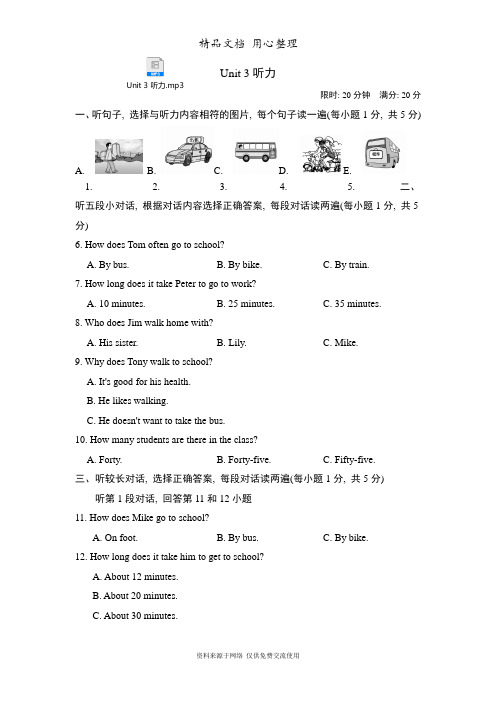
Unit 3听力限时: 20分钟 满分: 20分一、听句子, 选择与听力内容相符的图片, 每个句子读一遍(每小题1分, 共5分)A.B. C.D.E.1. ________2. ________3. ________4. ________5. _______二、听五段小对话, 根据对话内容选择正确答案, 每段对话读两遍(每小题1分, 共5分)6. How does Tom often go to school?A. By bus.B. By bike.C. By train.7. How long does it take Peter to go to work?A. 10 minutes.B. 25 minutes.C. 35 minutes.8. Who does Jim walk home with?A. His sister.B. Lily.C. Mike. 9. Why does Tony walk to school?A. It's good for his health.B. He likes walking.C. He doesn't want to take the bus.10. How many students are there in the class?A. Forty.B. Forty-five.C. Fifty-five. 三、听较长对话, 选择正确答案, 每段对话读两遍(每小题1分, 共5分)听第1段对话, 回答第11和12小题11. How does Mike go to school?A. On foot.B. By bus.C. By bike.12. How long does it take him to get to school?A. About 12 minutes.B. About 20 minutes.C. About 30 minutes.Unit 3 听力.mp3听第2段对话, 回答第13~15小题13. How does Tom usually get to school?A. By bike.B. By bus.C. By subway.14. How far is it from Tom's home to school?A. About 5 kilometers.B. About 15 kilometers.C. About 25 kilometers.15. Why does Mary walk to school?A. Because her home is not far from the school.B. Because she likes walking.C. Because she wants to do exercise.四、听短文, 完成表格, 短文读两遍(每小题1分, 共5分)Unit 3 测试限时: 60分钟满分: 100分一、单项选择(每小题1. 5分, 共15分)1. I take ________ quick shower at 6: 30 a. m. every day. Then I have ________breakfast at 7 a. m.A. a ; aB. a; /C. an; theD. /; a2. —________ is it from your home to school?—Three kilometers.A. How farB. How muchC. How manyD. How soon3. —Have you finished your homework, Sue?—Yes. It____________ me an hour to do it.A. spentB. tookC. useD. paid4. I usually go to work ________bike but today I go to work ________ the bus.A. by; byB. in; inC. by; onD. in; by5. —________ do you get to Shanghai?—By train.A. HowB. WhatC. WhenD. Where6. —How many people are there in the house?—________.A. Hundred ofB. Two hundredsC. Two hundreds ofD. Two hundred7. Gina is an ________ girl. She is very shy.A. eight-year-oldB. eight-years-oldC. eight years oldD. eight year old8. —Is it boring ________ the piano every day?—Yes, it is.A. playB. playingC. to playD. to playing9. There are ________ birds in the park.A. muchB. a lotC. lotsD. many10. —________ do you ________ this new club?—It's nice and big.A. What; think ofB. How; think ofC. What; likeD. How; think二、完形填空(每小题1. 5分, 共15分)I have a friend in China. He is a student in a small________11. His name is Tian Tao. He________12 about ten kilometers from his school. There is a very big ________13 between his school and the village. There is no bridge and the river________14too quickly for boats. He has to go on a ropeway to cross the river. So it isn't________15for him to get to school.Every morning, Tian Tao________16 at about five o'clock and has breakfast quickly. Then he leaves for ________17 at about half past five. First, he walks to the river. It takes him about 50 minutes ________18the roads are bad. Then it ________19 him twenty minutes to go on a ropeway to cross the river, but he isn't ________20. “I love my school. I love my teacher, ” he says, “I have a lot of fun in our school. ” He studies very hard at school.11. A. bank B. village C. park D. zoo12. A. makes B. lives C. buys D. plays13. A. river B. lake C. town D. village14. A. swims B. runs C. leaves D. jumps15. A. difficult B. interesting C. easy D. boring16. A. gets up B. goes to bedC. takes a showerD. goes to work17. A. school B. home C. station D. stop18. A. so B. but C. because D. or19. A. spends B. enjoys C. takes D. finds20. A. old B. funny C. busy D. afraid三、阅读理解(每小题3分, 共15分)It is very important for children to get to school safely and on time every day. Luckily for them, there is a new program called Free Home to School Transport. It gives children free rides to school. But to enjoy the free trip, children have to qualify(具备资格). It usually depends on where the children live, which school they are going to and how old they are.Children can take Free Home to School Transport if they:●are between 5 and 16 years old●are going to the nearest school●live farther away from the school than the statutory(法定的)walking distances(2 miles for students under 8, and 3 miles for those aged above 8).No matter (无论) how far away children live from school, they can take the free transport if they have walking problems or there is no safe road for them. A safe road usually has crossings, lights and should be clean.Also, there are still Free Home to School travel policies for children in poor families and children with special educational needs. You can find out more on the Internet and see if your children are qualified.21. According to the passage, it is very important for children not to be ________ forschool every day.A. lateB. awayC. earlyD. ill22. To enjoy the program, a child should go to the ________ school.A. famousB. bestC. nearestD. free23. A 9-year-old boy who lives ________ mile(s)away from the school qualifies forthe program.A. 1B. 2C. 2. 5D. 424. The underlined word “policies” means “ ________ ” in Chinese.A. 名额B. 政策C. 方法D. 目标25. Which of the following is TRUE?A. Seventeen-year-old students can take free rides to school.B. If Tom has some problems with his leg, he can enjoy the program.C. Poor children cannot have free transport to school.D. A safe road should be near the school and have lights.四、词汇考查(每小题1分, 共10分)根据句意及汉语或首字母提示完成句子26. Hold on to your ________ (梦想). One day it may come true.27. Many________(村民) never leave their hometown.28. That is a ________(真实的) story. We all like it.29. ________(每个) student can go to the park with us this weekend.30. His grandfather is ________(七十) years old.31. A quarter is the same in meaning as fifteen m .32. I am n here, so I don't know the way to the station.33. My sister usually d her car to work.34. You can take the s or the bus to the hospital.35. Some people on the farm(农场) can r the horse.五、用方框中所给单词的适当形式完成短文(每空1. 5分, 共15分)Chris is 12 years old. He________36 in a village in England.The school in his village is not far ________37 his home, so Chrisoften goes to school on foot. Chris usually gets up at about 7: 00 inthe morning. It is not ________38 . So he has a quick breakfast. He ________39 for school at about 7: 50. It takes him about 10 minutes to ________40 to school. He gets to school at about ________41 o'clock. Sometimes Chris rides his bike to school. School starts at 8: 10. His favorite subject is math. He thinks numbers are ________42.Chris has a ________43 . He hopes to go to a big city like London some day. So he can take the subway. “I ________44 to take the subway. It must be a lot of fun, ” he says.Can his dream________45 true? “Sure, it can, ” says Chris.六、书面表达(共30分)假如你是陈明, 你在美国的笔友Mike 向你询问你平时上学的方式, 请根据下表中的信息, 给你的笔友写封邮件, 向他介绍一下自己上学的方式并谈谈你的感受。
人教版七年级英语下册Unit3_听说课精品课件
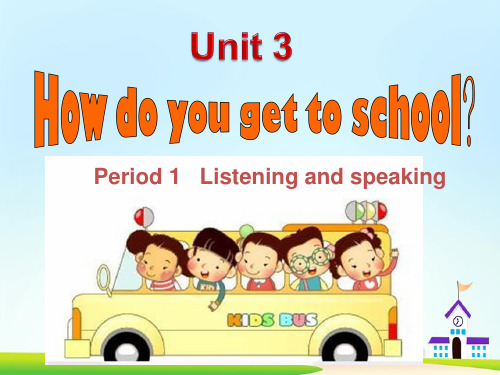
你发现了吗?
ride a bike = by bike= rides to 骑自行车
walk to = on foot 走路、步行 take the subway = by subway
乘坐地铁 take the train = by train 乘坐火车 take a car = by car= drive to
3.How long does it take you to ……?
get home
Summary
交通工具表达方式:
1 .take+a/the+交通工具名称 2. by+交通工具名称 3.动词(walk/drive/fly/ride)+ to+地点
Homework
1.Write the new words.
50 yuan for the dictionary.
Sb + spend +时间/金钱 (in) doing sth. 如: 他玩了两小时电子游戏。 He spent two hours (in) playing computer
gan sth.
她买那条裙子花了150元。 She spent 150 yuan on the skirt.
2e Pairwork
Role-play the conversation.
Lisa: Hey, Jane. Is this your new bike? Jane: Yes. I ride it to school every day.
How do you get to school? Lisa: I usually take the bus. Jane: How far is it from your home to
九年级英语上册Unit3知识点归纳

九年级英语上册Unit3知识点归纳九年级英语上册Unit3知识点归纳 1.取钱 get some money 2.买一些杂志/邮票 get/buy some magazines 3.获取一些有关小镇的信息get some information about the town 4.买一双鞋 get/buy a pair of shoes 5.买一份报纸 buy a newspaper 6.买一本字典 buy a dictionary 7.买一些有票 buy some stamps 8.吃饭 have dinner 9.怎样到达… how t o get to sp 10.沿着 go along/ go down 11.在银行的旁边 beside the bank 12.在右边 on the right/left 13.在某人的右边on one’ s right 14.去三楼 go to the third floor 15.向左转 turn left/ right 16.在…之间between …and… 17.走过书店 go past the bookstore 18.做…激动 be excited to do sth.19.从/以…开始 start/ begin with 20.不必匆忙 not need to rush 21.有……独特之处be special about.. . 22.加油 , 过来 come on 23.休息室 a room for resting 24.请再说一次 pardon me 25.抓住某人的手hold one’ s hand 26.摇滚乐队 a rock band 27.起初 at first 28.在去.......的路上on one’ s way to... 29.经过、路过 pass by 30.开始玩 start playing 31.沿 ... 走;走上;走近walk up 32.在门边 at the door 33.在门旁 by the door: 34.在那个时刻 at that time 35.来得更早点 come a little earlier 36.占位子 get a table 37.一些吃的东西 something to eat 38.最近的银行 the nearest bank 39.寄信 mail a letter 40.在购物中心 in the shopping center 41.寻求帮助 ask for help 42.怎样有礼貌的寻求帮how to ask for help politely 43.学会怎样才是礼貌的 learn how to be polite 44.在不同的情况 in different situations 45.使用恰当的语言 use the suitable/right/proper language 46.立足于以…为根据 base on 47.取决于/依靠 depend on 48.引入一个请求 lead in to a request 49.停车park one’ s car 50.一个地下停车库an underground parking lot 51.换钱change money 52.去.......的路 the way to... 53.在一个说英语的的国家 in an English-speaking country 54.进行一个短期的假期学习 go on a short study vacation 55.为……感谢某人thank sb. for doing sth.56.期待 look forward to+n./doing 57.醒来 wake up 58.仓促地做某事 in a rush to do sth 59.做某事很方便 be convenient to do 60.第一次见到某人meet sb. for the first time 61.更擅长 become better at… 62.使…想起remind …of… 63.一个吃饭的好地方a good place to eat二、重点句型1. not…until… You never know until you try something. 凡事只有亲身经历了才能了解。
EIM-Starter-Unit-3单元测试题全文
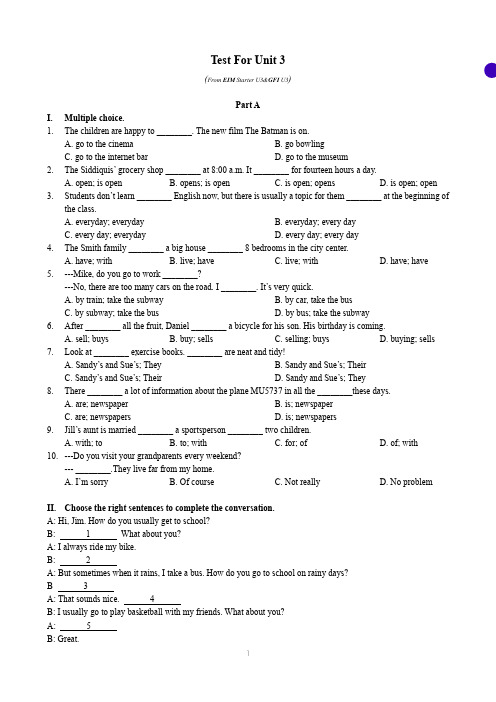
Test For Unit 3(From EIM Starter U3&GFI U3)Part AI.Multiple choice.1.The children are happy to ________. The new film The Batman is on.A. go to the cinemaB. go bowlingC. go to the internet barD. go to the museum2.The Siddiquis’ grocery shop ________ at 8:00 a.m. It ________ for fourteen hours a day.A. open; is openB. opens; is openC. is open; opensD. is open; open3.Students don’t learn ________ English now, but there is usually a topic for them ________ at the beginning ofthe class.A. everyday; everydayB. everyday; every dayC. every day; everydayD. every day; every day4.The Smith family ________ a big house ________ 8 bedrooms in the city center.A. have; withB. live; haveC. live; withD. have; have5.---Mike, do you go to work ________?---No, there are too many cars on the road. I ________. It’s very quick.A. by train; take the subwayB. by car, take the busC. by subway; take the busD. by bus; take the subway6.After ________ all the fruit, Daniel ________ a bicycle for his son. His birthday is coming.A. sell; buysB. buy; sellsC. selling; buysD. buying; sells7.Look at ________ exercise books. ________ are neat and tidy!A. Sandy’s and Sue’s; TheyB. Sandy and Sue’s; TheirC. Sandy’s and Sue’s; TheirD. Sandy and Sue’s; They8.There ________ a lot of information about the plane MU5737 in all the ________these days.A. are; newspaperB. is; newspaperC. are; newspapersD. is; newspapers9.Jill’s aunt is married ________ a sportsperson ________ two children.A. with; toB. to; withC. for; ofD. of; with10.---Do you visit your grandparents every weekend?--- ________.They live far from my home.A. I’m sorryB. Of courseC. Not reallyD. No problemII.Choose the right sentences to complete the conversation.A: Hi, Jim. How do you usually get to school?B: 1 What about you?A: I always ride my bike.B: 2A: But sometimes when it rains, I take a bus. How do you go to school on rainy days?B 3A: That sounds nice. 4B: I usually go to play basketball with my friends. What about you?A: 5B: Great.III.Close text.Jimmy is a middle school student. There is a new student in his __1__ and his name is Peter.After school, Jimmy __2__ Peter and says, “Peter, what about going home by bus together?”“Oh, sorry. Jimmy. My __3__ is there and I need to ride it home,” says Peter. “I have an idea.Why don’t you ride to school? Then, we can ride and have fun.”“But, but ...” says Jimmy.“But __4__?” asks Peter.“Well, I can tell you, but you can’t laugh at __5__.” Jimmy says.Peter says, “Hey, friends don’t laugh at each other. Friends __6__ each other.”“I ... I can’t ride a bike. It’s __7__ for me and I’m afraid of ...”“Ah, I see. Let me __8__ you. I’m good at riding and it’s really fun.”Jimmy says “__9__ and he’s happy to have a friend __10__ Peter. And he thinks it’s interesting to ride with his new friend.1. A. class B. store C. club D. station2. A. writes to B. comes to C. plays with D. talks about3. A. bus B. car C. bike D. train4. A. how B. why C. what D. when5. A. me B. her C. us D. them6. A. find B. help C. know D. leave7. A. boring B. relaxing C. interesting D. difficult8. A. stop B. join C. teach D. thank9. A. OK B. Bye C. Hi D. No10. A. for B. by C. like D. withIV.Reading comprehension.ARead the passage and judge the five statements. If it is True, choose A. If it is false, choose B.Mr. Jones and Mr. Brown work in the same office. One day Mr. Jones says to Mr. Brown. “I will have a small party at my house on Monday evening. Would you and your wife like to come?”Mr. Brown says, “Thank you very much. I’d love to, but let me ask my wife first.” So Mr. Brown goes to the other room and telephones his wife. Then he comes back and looks very worried.“What’s the matter?” asks Mr. Jones. “Is your wife there at home?”“No,” answers Mr. Brown. “She isn’t there. My small son answers the telephone. I say to him, ‘Is your mother there, David?’ and he answers ‘No, she isn’t in the house’ ‘Where is she?’ I ask, ‘She is somewhere outside.’ ‘What’s she doing?’ ‘She is looking for me.’”1.There is a party at Mr. Jones’ house on Monday evening.2.Mr. Jones asks Mr. Brown and his child to go to the party.3.The telephone is in Mr. Jones and Mr. Brown’s office.4.Mr. Brown speaks to Mrs. Brown on the telephone.5.Mrs. Brown is looking for her son.BRead the passage and choose the correct answer.The Lambert family live near a big river. They are a family of four. Mr. Lambert is a teacher. He teaches English in a middle school. He can also speak French and Spanish. His school is near the river, so he goes to work by boat every day. Mrs. Lambert has a small bookshop. The books there are all interesting. Mrs. Lambert is very nice, so people like reading in her bookshop. Mr. and Mrs. Lambert have two children. One of them is Elena. She is only 5 years old. She likes riding her bike near their house. Sometimes she goes swimming in the river. She is a very good swimmer. Philip, the son of the family, doesn’t like swimming, but he likes the river. He likes fishing. His favorite thing after school is going fishing with his dad in a boat. He is only 12 years old, but he is really good at it.6.Mr. Lambert CANNOT speak __________.A. EnglishB. FrenchC. SpanishD. Chinese7.What can we know about Mrs. Lambert?A. She reads a lot.B. She sells books.C. She is very interesting.D. She goes to work by boat.8.Elena is Philip’s __________.A. teacherB. classmateC. sisterD. cousin9.Why does Philip like the river?A. Because his father works on the river.B. Because the river is very beautiful.C. Because he likes swimming.D. Because he likes fishing.10.What’s the best title (标题) of the passage?A. A great shopB. A good swimmerC. The Lambert familyD. The Lambert family’s habitPart BI.Fill in the blanks with the proper forms of the words given.1.Sally’s brother likes __________ (photograph). Look at these photos he takes. They are amazing, aren’t they?2.We have got a cat. __________ (it) name’s Bubble. It is my little son’s best friend.3.Liangliang from a small village in China __________ (cross) a river with a ropeway to go to school fromMonday to Friday.4.The children go home __________ (happy) with their parents after they have a great time in the theme park.5.The twins stay with their grandparents in the village. It is their dream __________ (live) together with theirparents in the city.6.Do you know those __________ (teenage) names? Here are prizes for every one of them.7.Ann is twenty years old, but she is still afraid of __________ (go) out alone at night.8.It takes these villagers a few minutes to go to their __________ (factory) in the town. They are near their homes.9.Jack and Dean only have some fruit and vegetables for supper after they finish __________ (run) for one hourin the gym.10.The Yellow River __________ (call) the mother river of China. It has a long history.II.Pattern shift.1.Patrick’s father looks young. In fact, he is sixty-two years old.=Patrick’s father looks young. __________, he is sixty-two years old.2.My brother is eight years old.=My brother is __________ __________ boy.3.Anna never fights with her friends.=Anna never __________ __________ __________ her friends.4.Kate has a small brother and a big sister.=Kate is __________ of the children.5.--- __________ __________ __________ it __________ you to the company?---About 15 minutes by bike.III.Fill in the blanks with proper words according to the first letter given and the texts you have learnt.⚫Is Kate Middleton a n____1____ woman? Not really. Her h____2____ is Prince William, the Duke of Cambridge. They have a son named George and a d____3____ named Charlotte. Their home is an a____4____ in Kensington Palace. It has twenty bedrooms and three k____5____.⚫The Jackson family live in Chester. They r____6____ a house. They save m____7____ when they can to buy their o____8____ house. Daniel works in a factory. Jill works as a s____9____ in a school. After work, she drives to their children’s school and t____10____ them home.⚫Students in our school can join different o____11____, such as the art club, music club, football club and so on.⚫Mum wants me to go s____12____ with her. There are few vegetables and little fruit. She wants to buy some.⚫People in Ukraine (乌克兰) want to live in peace(和平). Will their dream come t____13____ soon?⚫There are two b____14____ over the river. One is made of stone, and the other is made of wood.⚫Jack is my c____15____. He is the son of my uncle and aunt.plete each blank in the following conversation with ONE word only.A: Hello, Jane. Welcome to Chengdu Foreign Languages School. Are you from America?B: Thank you, Jack. Yes, I’m from New York.A: Do you and your parents all ____1____ in China now?B: Yes, they have new jobs here. And all of us love this country.A: Are you the ____2____ child in your family?B: No, I have a big sister and a small brother. They are fifteen and ten.A: Can you tell me something about ____3____ families?B: Sure. Families in America are usually ____4____ with three or four people: parents and one or two children. A: They are ____5____ most families in China now. Do children need to do housework at home?B: Of course. In many families, parents ask their children to do some housework and they often give them some money for doing it.A: That’s nice. Chinese children don’t often do that. We are too ____6____ with the school work from 8 a.m. to 9 p.m.B: 1 see. And children in America live together with their parents ____7____ they are eighteen.A: Do you mean they ____8____ their parents’ home?B: Yes, they usually live far from parents because of their work. And they visit them at ____9____ when they don’t have to go to work.A: That’s very different from Chinese families. Thanks for ____10____ me so much.B: You’re welcome.in Guiyang, Guizhou. During the holidays, she doesn’t travel like some students in big ____2____. She just staysat home and helps her parents do farm work.____3____ do you have your classes? In the classroom, right? What aboutthe middle school girl? ____4____ school is in a cave (岩洞)! The school ____5____ Dangzhong Middle Cave School is in a big cave of a mountain. Dongzhong itself ____6____ “in cave.” Every day, students go ____7____ rivers and mountains to study there. It takes them over one hour ____8____ to school and it is very dangerous. There are 186 students and eight ____9____ in this school.Next time when you think life is ____10____, think of those students.。
七年级下英语unit3练习题

七年级英语unit3练习题1.How does Mary _________(到达学校)?She ______________(乘地铁)to school.2. How does Bob go to work? He _____________(乘火车) to work.3.I ______________(骑自行车)to school every day.4.__________(多远)is it from your home to school? It’s only about ______(两公里).5.______________多长时间)does it __________(花费)get to school?It ________________________(花费大约15分钟).6.Does Jane ___________________(步行去学校)?7. Do they _______________________(乘公共汽车去学校)?8.Does your dad ______________(开小汽车)to work?9._________________________(他认为----怎么样)the trip?10.______________(对许多学生来说),_____________(是容易的)to get to school.11.He lives ________________(在一个小山村里).12.There is a very big river________ their school ________(在---之间)the village.13.There is no bridge and the river_______________(流速很快)for boats.14.These students _________________________(乘索道过河)to school.15.He is ________________(一个11岁的男孩).16.Tom______________(不害怕)to go out at night.17.He __________(就像)a father to me.18.It is their dream ____________________(有一座桥).19.Can their dream __________ (实现)?20. My school is about 20 kilometers__________(从我家).21.It takes 40 minutes ___________________(乘公共汽车到那儿).22.He takes the bus to work. He__________ to work __________ _____________.23.She walks to school. She ________ to school ______________ _____________24.They go to school by bike. They _________ __________ _________ to school.25.It’s takes him 20 minutes to get to school.(划线提问)________ _________ ___________ it take to get to school?26.It’s about 60 kilometers from my home to school. (划线提问)___________________ is it from_________ home to school?27.Lucy _______________(drive)her new car to work every day.28.It takes_________(he)20 minutes __________(get)there.29.His home is about three______________(hundred)kilometers from here.30.She need 10 minutes _______________(get)home.31.It’s not easy____________(go)on a ropeway to school.32.The boy is 11______________(year)old.33.He ____________(cross)the river to school every day.34.It’s his dream _____________(leave)h is village one day.( )1. I usually go to work ___ bike, but today I go there ____ a car.A. by, byB. on, inC. by, inD. on, on( )2. My friend ____ the river to school.A. have to crossB. has to crossC. have to crossingD. has to crossing ( )3. Thanks _____ your help.A. a lot ofB. a lot forC. lots forD. lots of( )4. ____ do you think of your school life?A. WhyB. HowC. WhatD. When( )5. How far do you live ____ the bus stop?A. onB. inC. withD. from( )6. Lily needs _____ more, she isn’t _____.A. exercises, healthB. to exercise, healthC. exercises, healthyD. to exercise, healthy( )7. It’s time for dinner. Let’s _____ TV.A. stop to watchB. stop watchingC. to stop to watchD. to stop watching ( )8. --- ____ is it from your home to school?---Fifteen minutes’ walk.A. How longB. How muchC. How farD. How old( )9. It takes you half an hour _____.A. getting homeB. getting to homeC. to get homeD. to get to home ( )10. My mother often _____ her car to work.A. takesB. byC. inD. drives( )11. My brother is _____ boy.A. 8-year-oldB. a 8-year-oldC. 8 years oldD. an 8-year-old( )12. Tom sits _____ you ____ me.A. either, orB. from, toC. between, andD. both, and ( )13. Five _____ are in the room.A. hundred peopleB. hundreds peoplesC. hundred peoplesD. hundreds of people ( )14. ---Can you go shopping with me?--- ______. I have much homework to do.A. I’m sureB. I’m afraid soC. I’m not afraidD. I’m afraid not( )15. Do you go there ____ or _____?A. by bike, by subwayB. by bike, take a subwayC. ride a bike, take a subwayD. ride the bike, in the subway16. —______does your friend go to work?—He takes the subway.A. WhenB. WhyC. HowD. What17. I go to schoo_____bike and my sister goes to school_____foot.A. by; byB. by; onC. on; onD. on; by18. It’s______kilometers from here to Shanghai.A. two hundred and seventy fiveB. two hundred and seventy-fiveC. two hundreds and seventy fiveD. two hundreds and seventy-five19. I don’t know______. Can you tell me?A. where he livesB. where does he liveC. he lives whereD. does he live where20. I live near a_______. I often go swimming in summer.A. mountainB. cityC. villageD. river21. There are many______and much______on the table.A. apple; meatB. apples; meatC. meat; appleD. meat; apples22. We can see a playground______the two tall buildings.A. betweenB. amongC. inD. on23. —Is Alice ill today? —______.A. I’m afraid soB. I’m sorry to hear thatC. Well doneD. I’m afraid not24. The______girl can play the piano well.A. seven years oldB. seven-years-oldC. seven-years oldD. seven-year-old25. It isn’t easy for us______a foreign language.A. learnB. learnsC. learningD. to learn26. —How long does it take your father_____to work every day? —About half an hour.A. drivesB. drivingC. to driveD. drove27. —What do you______the book? —It’s interesting.A. think outB. think ofC. think upD. think over28. We all like Mr. White. He is_____a friend_____us.A. like; likeB. to; likeC. like; toD. to; to29. Please cheer up! We believe your dream can______one day.A. come inB. come outC. come trueD. come on30. —______is it from here to the railway station? —About ten kilometers.A. How farB. How fastC. How soonD. How oftenII. 完成句子。
新目标英语七年级下册unit3-全单元课程案例

一、将下列句子译成英语。
1. 你怎样去学校?我骑车去学校。 How do you get to school? I ride the bike (to school). = I get to school by bike.
2. 她怎样去学校?她乘火车去学校。
How does she get to school? She takes the train (to school). = She gets to school by train.
Make conversations.(编对话) A: How do you get to school?
B:
... to school.
get to school by/on...
A: How does your mother go to work?
B: She rides a bike to
1. I take the train to school. = I get to school _b_y__t_ra_i_n___. 2. She takes the subway to school. (同义句) She _g_e_ts__ to school _b_y_ _s_u_b_w_a_y_.
A: How does she get to work? B: She takes the subway to work.
=She gets to work by subway.
=She gets to work on a subway.
Ⅱ.用所给词的正确形式填空。
ride take get to by
1) How do you __g_e_t__t_o_ school in the
Unit 3 Section B(1a-1d)七年级英语下册(人教版)
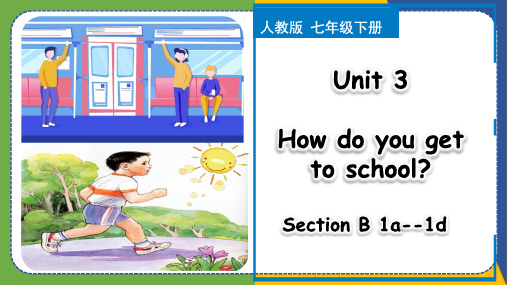
2. 宾语从句
Language points 语言点
充当宾语成分的句子叫宾语从句,常置于动词、介词、形容词后作 宾语成分,并由连接副词(when,where,wht,how……)连接。 宾语从句要用陈述语序。
Mary wants to know where Bob lives.
Bob: Yes, it is. So I go there and see my grandparents only one or two times a year.
Mary: How do you get there?
一年两次
Bob: I usually take the train.
Mary: How long does it take?
Mary wants to know how far he lives from his grandparents’ home.
Mary wants to know how he gets to his grandparents’ home.
Mary wants to know how long it takes to get to his grandparent’s home.
Then I take the subway.
1b Tell your partner how you get to school. Imagine you use
two types of transportation.
TAXI
A: How do you get to school? B: First, I …
How far is it (from your home to school)?
五年级上册英语第二单元过关测试B卷Unit2Myweek人教PEP版版解析含答案
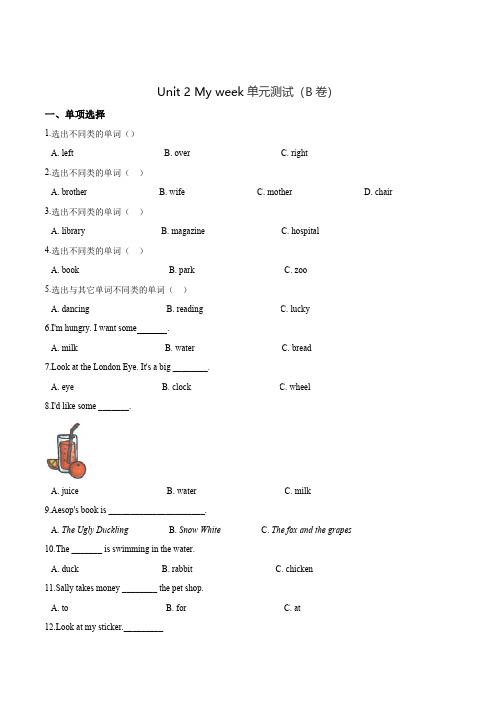
Unit 2 My week单元测试(B卷)一、单项选择1.选出不同类的单词()A. leftB. overC. right2.选出不同类的单词()A. brotherB. wifeC. motherD. chair3.选出不同类的单词()A. libraryB. magazineC. hospital4.选出不同类的单词()A. bookB. parkC. zoo5.选出与其它单词不同类的单词()A. dancingB. readingC. lucky6.I'm hungry. I want some .A. milkB. waterC. bread7.Look at the London Eye. It's a big ________.A. eyeB. clockC. wheel8.I'd like some _______.A. juiceB. waterC. milk9.Aesop's book is ______________________.A. The Ugly DucklingB. Snow WhiteC. The fox and the grapes10.The _______ is swimming in the water.A. duckB. rabbitC. chicken11.Sally takes money ________ the pet shop.A. toB. forC. at12.Look at my sticker._________A. I think they're very beautiful.B. I think it's beautiful.C. I like them.13.Today is October the ________.A. thirdB. threethC. three14.— is the butterfly?—It is purple and yellow.A. WhereB. What colourC. what colour15.Show me the word .A. classroomB. school二、单词拼写16.Don's run ________(跑下) the ________(楼梯).17.This tall________ (建筑物) is the science lab.18.I ________(有)many ________(语文)books.19.—Do you always read books in the evening?—N________ (从不). I often read books in the morning.20.It is________ juice.三、选词填空21.Sally's birthday is ________ June. (in/on)22.My little brother likes ________(watch/watching) films.23.—Excuse ________(me/mine). Is this your bag?—Yes, it is.24.Have you________ (got/get) a book about America?25.________ (Do/Does) you have a dog?四、句型转换26.Those are hami melons. (对画线部分提问)27.I'm a dog .(变成否定句)28.They're my father's.(改为一般疑问句)________五、连词成句29.he by come to bike school (.)(连词成句)30.Grade Five ,am , I ,Class Two ,in ( .) (连词成句)31.a What girl beautiful(!)(连词成句)32.by , he , goes , work , to , bike (.)_六、补全对话33.补全对话A: Hi, Darning.B: Hi, Sam.A: Can I ask you some questions?B: ________A: When is the Tree Planting Day?B: ________A: ________B: We plant trees.A: ________B: Because trees can make the air clean.A: ________B: OK! See you tomorrow.A. It's in March.B. OK.C. Let's plant trees tomorrow.D. Why do people plant trees?E. What do you do on Tree Planting Day?七、阅读理解34.阅读判断。
七年级英语下册Unit3 SectionB 1a-1e课件
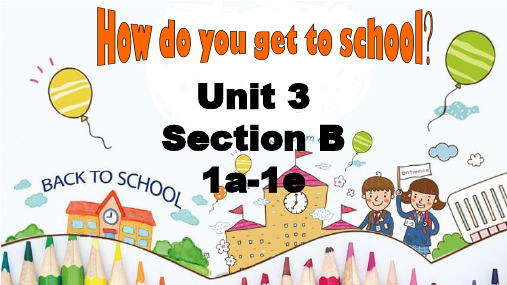
How do you get to school?
LJ1ais.naHe ::oIHwuoswduoafaellrsyiJstaaiktnefertohgmeetbyoutous.rsc+hgoeot tloesvcheoroyl bdy bauys?.
L2is.aH:ohIw'ommdneootetosssuLcrheiso…aolg?aebtoutot school?
_√__ how far he lives from his grandparents’ home. _√__ how he gets to his grandparents’ home. __√_ how long it takes to get to his grandparents’ home.
She rides a bike./By bike. 2. How does Lisa get to school?
She usually takes a bus./By bus.
3. How far is it from Lisa’s home to school? About ten kilometers.
Lisa: Yeah. Well, have a good day at school.
Jane: You, too.
2e
Post-listening
Read the conversation in 2e and answer the questions. 1. How does Jane get to school every day?
Lead in Where can you find these vehicles?
train
train station
20—21学年人教版七年级英语下册Unit3随堂达标测试题(附答案)
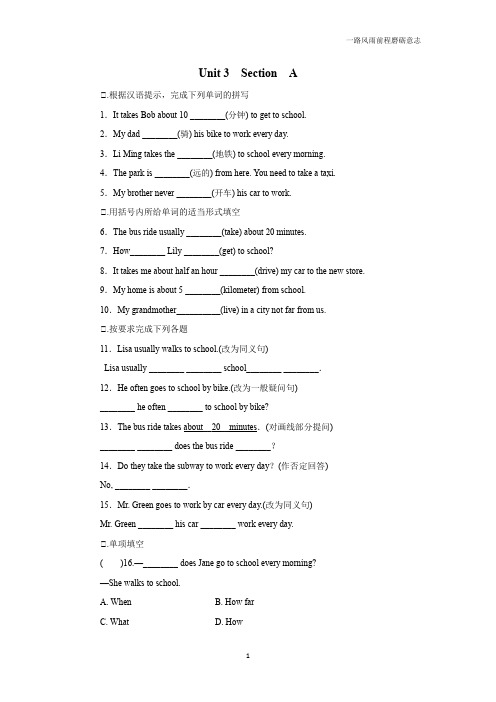
Unit 3 Section AⅠ.根据汉语提示,完成下列单词的拼写1.It takes Bob about 10 ________(分钟) to get to school.2.My dad ________(骑) his bike to work every day.3.Li Ming takes the ________(地铁) to school every morning.4.The park is ________(远的) from here. You need to take a taxi. 5.My brother never ________(开车) his car to work.Ⅰ.用括号内所给单词的适当形式填空6.The bus ride usually ________(take) about 20 minutes.7.How________ Lily ________(get) to school?8.It takes me about half an hour ________(drive) my car to the new store. 9.My home is about 5 ________(kilometer) from school.10.My grandmother__________(live) in a city not far from us.Ⅰ.按要求完成下列各题11.Lisa usually walks to school.(改为同义句)Lisa usually ________ ________ school________ ________.12.He often goes to school by bike.(改为一般疑问句)________ he often ________ to school by bike?13.The bus ride takes about__20__minutes.(对画线部分提问)________ ________ does the bus ride ________?14.Do they take the subway to work every day?(作否定回答)No, ________ ________.15.Mr. Green goes to work by car every day.(改为同义句)Mr. Green ________ his car ________ work every day.Ⅰ.单项填空()16.—________ does Jane go to school every morning?—She walks to school.A. WhenB. How farC. WhatD. How()17.—________ does it take you to walk to school?—About ten minutes.A.How far B.How longC.How D.How often()18.Mr. Zhao is going to the airport ________ taxi.A.in B.on C.by D.at()19.It takes me about half an hour ________to the bus stop.A.get B.to getC.getting D.to getting()20.2020·达州—________ is your school from your home, Gina?—Only ten minutes' walk.A.How long B.How farC.How many D.How soonⅠ.请先阅读下面短文,掌握其大意,然后用方框中所给的词的适当形式填空。
- 1、下载文档前请自行甄别文档内容的完整性,平台不提供额外的编辑、内容补充、找答案等附加服务。
- 2、"仅部分预览"的文档,不可在线预览部分如存在完整性等问题,可反馈申请退款(可完整预览的文档不适用该条件!)。
- 3、如文档侵犯您的权益,请联系客服反馈,我们会尽快为您处理(人工客服工作时间:9:00-18:30)。
• carbon footprint • 碳足迹;碳排放量
• scale英 [skeɪl] 美 [skel] • n. 规模;比例;鳞;刻度;天平;数值 范围 • vi. 衡量;攀登;剥落;生水垢 • vt. 测量;攀登;刮鳞;依比例决定
• mundane英 ['mʌndeɪn; mʌn'deɪn ] 美 [mʌn'den] • adj. 世俗的,平凡的;世界的,宇宙的
• 与…相比较 • be compared with • can be compared with 比得上 ; 无人 能比 • nothing can be compared with 无与 伦比
• • • •
incentive n. 动机;刺激 adj. 激励的;刺激的 incentive structure 激励结构 ; 诱因结 构 ; 激励机制 • Incentive Tour 奖励旅游 ; 奖勵旅游 ; 主要指公司会议I ; 公司奖励旅游 • Incentive Scheme 激励计划 ; 激励方 案 ; 奖励计划 ; 奖惩性方案
• subsidize英 [ˈsʌbsɪdaɪz] 美 ['sʌbsə' daɪz] • vt. 资助;给与奖助金;向…行贿 • subsidized rate 补贴价率
• deduct英 [dɪ'dʌkt] 美 [dɪ'dʌkt] • vt. 扣除,减去;演绎
• • • •
brisk英 [brɪsk] 美 [brɪsk] adj. 敏锐的,活泼的,轻快的;凛冽的 vi. 活跃起来;变得轻快 vt. 使……活泼;使……轻快;使……兴旺
• Be willing to do mundane tasks with good grace. • 有风度地主动做平凡的工作
• add up to • 合计达,总计达 • For a hit show, profits can add up to millions of dollars.
• 对于一个热门节目,利润可达上百万美 元。
stumble英 ['stʌmb(ə)l] 美 ['stʌmbl] vi. 踌躇,蹒跚;失足;犯错 vt. 使…困惑;使…绊倒 n. 绊倒;蹒跚而行 [ 过去式 stumbled 过去分词 stumbled 现在分词 stumbling ] • stumbling block 绊脚石;障碍
• cycle英 ['saɪk(ə)l] 美 ['saɪkl] • n. 循环;周期;自行车;整套;一段时 间 • vt. 使循环;使轮转 • vi. 循环;骑自行车;轮转
• • • •
mental英 ['ment(ə)l] 美 ['mɛntl] adj. 精神的;脑力的;疯的 n. 精神病患者 mental health 心理健康 ; 心理卫生 ; 精神健康 ; 精神卫生 • Mental illness 精神病 ; 精神疾病 ; 心 理疾病 ; 心理障碍 • Mental State 精神状态 ; 心理状态 ; 心 理 ; 心智状态
• repute英 [rɪ'pjuːt] 美 [rɪ'pjut] • n. 名誉;声望 • vt. 名誉;认为;把…称为
• pavement英 ['peɪvm(ə)nt] 美 ['pevm ənt] • n. 人行道 • 路面 • pave英 [peɪv] 美 [pev] • vt. 铺设;安排;作铺设之用
Powerade
• • • •
kit英 [kɪt] n. 工具箱;成套工具 vt. 装备 vi. 装备
• • • •
extreme extreme extreme extreme 环境
poverty 极端贫穷 sports 极限运动 point 极点,端点 environment 极端环境;极限
• in general英 美 • 总之,通常;一般而言 • And in general, what you give you tend to get back from • the world around you. • 通常情况下,你给予他人的,也往往可 以从你的周边的人那里得到
• reap英 [riːp] 美 [rip] • vt. 收获,获得;收割 • vi. 收割,收获
• entrenched英 [ɪn'tren(t)ʃt; en-] 美 • adj. 根深蒂固的;确立的,不容易改Байду номын сангаас • v. 确立;保证;挖掘壕沟(entrench的 过去分词
• • • •
concede英 [kən'siːd] 美 [kən'sid] vt. 承认;退让;给予,容许 vi. 让步 Bess finally conceded that Nancy was right. • 贝丝最终承认南希是对的。
• springboard英 ['sprɪŋbɔːd] 美 ['sprɪ ŋbɔrd] • n. 跳板;出发点 • vi. 利用跳板跃进 • The 1981 budget was the springboard for an economic miracle. • 1981年的预算造就了一场经济奇迹
Bike to Work: Reasons You Should Try
UNIT 3
Bike to work
Do you have a bike? Do you enjoy riding a bike? What benefits can people get from cycling?
• • • • •
• • • •
make sense 有意义;讲得通;言之有理 It all started to make sense. 这一切都开始变得有意义
• costly英 ['kɒs(t)lɪ] 美 ['kɔstli] • adj. 昂贵的;代价高的 • odd英 [ɒd] 美 [ɑd] • adj. 奇数的;古怪的;剩余的;临时的 ;零散的 • n. 奇数;怪人;奇特的事物
• You reap what you sow.
• • • •
dividend policy 股息分配方针 cash dividend 现金股利 dividend distribution 股息分配 stock dividend 股票的股息
• prohibitively[prəu'hibitivli] • adv. 禁止地;过高地;过分地 • prohibitive英 [prə(ʊ)'hɪbɪtɪv] 美 [prə 'hɪbətɪv] • adj. 禁止的,禁止性的;抑制的;(费 用,价格等)过高的;类同禁止的
• generate英 ['dʒenəreɪt] 美 ['dʒɛnər et] • vt. 使形成;发生;生殖 • generation 一代;产生;一代人;生殖 • generator 发电机;发生器;生产者
• • • • • •
belch英 [beltʃ] 美 [bɛltʃ] vi. 打嗝;喷出 vt. 打嗝;喷出 n. 打嗝;喷出物 belch out 喷出 The power-generation plant belched out five tons of ash an hour. • 发电厂每小时喷出了5吨的灰。
